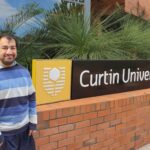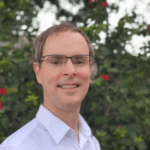Meredith Grose is a self-confessed people person. Although she completed a Bachelor of Commerce, and worked for many years in human resources in government, she decided she was better suited to allied health and in 2014 enrolled in a Bachelor of Social Work at Curtin University. Meredith is totally blind, so completing not one but two tertiary degrees is no mean feat.
Most students feel some trepidation before starting their degrees but, second time around, Meredith already knew what lay ahead and that her studies would require a different set of skills to a typical student’s, and more determination than most.
“I didn’t really have any expectations, I just knew it was going to be hard and I was right about that. For the first three semesters we had to do general health sciences units and we only had a couple of social work units, and I was told at the beginning that if we got through that then we would probably manage,” Meredith said.
Meredith accessed Curtin’s Disability Services, which are available to all students with disabilities, had scribes for lectures and workshops and made use of technology to assist in reading textbooks and documents.
“Curtin has a disability and counselling service. So I had a disability officer, who I’ve had from virtually when I put in my application, and she was always my go to person if things went incredibly wrong. I’m the kind of person who would try to sort out something myself first and, if I couldn’t, I’d go to her and say, ‘I can’t do this’. I’m really fortunate that I had that person that I could ring up and vent to, which I didn’t do that often. She’s not a part of the school, so there was no conflict.
“Generally the lecturers and unit coordinators were supportive and they’d all tell me they’d learnt more from me than I possibly learnt from them.”
“I would go to my lecturer or coordinator as a first step, but there were times where I knew I wouldn’t have got that far. I’m conscious that they’re busy and they’ve got 200 other students, or whatever it is, and my needs are immediate.
“I use various things [to support me]. If it’s something basic my phone will take a picture and read it back in voice, or I have had groups of transcribers who transcribe lecture notes into an accessible format. Just because something is available electronically, doesn’t mean I can read it. It depends on the format, and some publishers are more committed than others to providing materials in an accessible format.
“I had scribes in the workshops and lectures, which took a lot of pressure off me and meant that I could actually be involved in class activities rather than use my brain for 45 different other [requirements]. The scribe would also be a support to move around the room, or if the lecturer put something on the board but forgot to tell me, or gave me handouts and materials I couldn’t read – that on-the-spot kind of stuff.”
Along with the support that Curtin offers to students with disabilities, Meredith describes her ability to advocate for herself as critical to her success as a student. She cites the values embedded in the course content as particularly relevant to her circumstances, informing both her self-advocacy at university and her support of clients on placements.
“I’m fortunate I’ve got a voice and I can use it. I am very good at advocating because I’ve had to be.”
“It’s always in the back of my mind that there are other students who may have anxiety issues, or other issues, who are not as competent or as confident as I am. In that sense I’m in a fairly fortunate position.”
“The most useful things I’ve learnt are being persistent, being patient, advocating for self-determination and listening. And that’s what I’ve learnt on placement with my clients as well, it’s all those good social work values that they teach you.
“Respecting the person, advocating for self-justice, walking alongside in their journey and working out which way they want to go, not enforcing your beliefs and your attitudes.”
Meredith describes her social work placements as an invaluable way to develop on-the-job knowledge and skills, as well offering an opportunity to experience different aspects of social work, and narrow down an area to specialise in after graduating. For Meredith, that area is counselling.
“I did my first placement at Advocare, which is an agency that advocates for people that are either having difficulties in the aged care system or are trying to access the aged care system, or issues around elder abuse,” she said.
“My final placement was at Centacare. That was a counselling role and that’s the direction I’m looking at. You never knew what was going to walk through the door [and that’s what I liked]. I saw one client and in session two she said ‘I can do this’ and that’s a good feeling because that’s the aim. I did a lot of telephone screenings and you learn a lot from them. I didn’t always see every client that I screened, but I made sure I’d take detailed notes for whoever was going to see that client. That was important to me. I told their stories succinctly and included as much detail as possible.
“I want to get out and see what’s out there. I know working with children is not an area I’d want to pursue, for safety reasons for me, and I think hospital social work would have its challenges and I wouldn’t want to do that either. Those really traditional roles are not for me but it’s a broad church and there are many directions I can go.”



